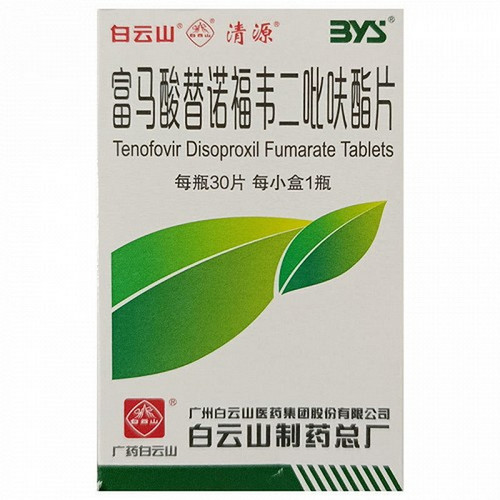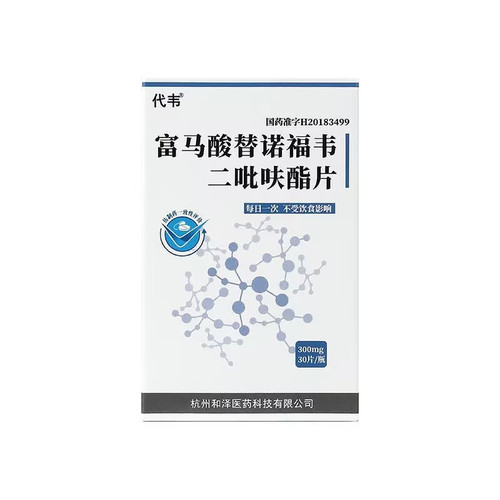Product Overview
[Drug Name]
Generic Name: Tenofovir Disoproxil Fumarate Tablets
Trade Name: Zhengwen Tenofovir Disoproxil Fumarate Tablets 0.3g*30 Tablets
Pinyin Code: ZhengWen FuMaSuanTiNuoFuWeiErZuoZuoZuoPian 0.3g*30 Tablets
[Main Ingredient]
Tenofovir Disoproxil Fumarate.
[Properties]
This product is a film-coated tablet that appears white or off-white after removal of the coating.
[Indications/Main Functions]
HIV-1 Infection: This product can be used in combination with other antiretroviral drugs to treat HIV-1 infection in adults. However, it should not be used with emtricitabine/tenofovir combination preparations or efavirenz/emtricitabine/tenofovir disoproxil fumarate preparations.
[Specifications]
0.3g*30 tablets (Zhengwen)
[Dosage and Administration]
Oral, 300mg once daily, can be taken on an empty stomach or with food.
[Adverse Reactions]
In both studies, nearly one-third of patients in the zetazone group experienced adverse reactions, but the incidence was similar to that in the control group. Common adverse reactions include mild to moderate gastrointestinal discomfort (commonly diarrhea, nausea, vomiting, and flatulence); metabolic hypophosphatasia (1% incidence); and mild to moderate decreases in serum phosphate (12% in the zetazone group, 7% in the control group, and 15% in the zetazone group at 24 weeks and 58 weeks). There is a risk of lactic acidosis.
[Contraindications]
This drug is contraindicated in patients with a prior allergy to any of the components.
[Drug Interactions]
1. This drug may interfere with the blood concentration of didanosine. Tenofovir should be taken 2 hours before or 1 hour after didanosine. 2. Co-administration of didanosine with this drug may increase didanosine plasma concentrations, increasing the risk of pancreatitis. 3. This drug is excreted through the kidneys via glomerular filtration and tubular secretion. Co-administration with other drugs excreted via tubular secretion may increase their plasma concentrations. Drugs that reduce renal function may also increase this drug's plasma concentration. 4. Co-administration of this drug with lamivudine, indinavir, lopinavir, and ritonavir may decrease the plasma concentrations of these drugs.
[Precautions]
1. Use with caution in patients with hepatic insufficiency. Reproductive toxicity is classified as B; use with caution in pregnant women. 2. It is unknown whether this drug is present in breast milk; all women with HIV are advised to refrain from breastfeeding. 3. Obesity may increase the risk of drug use. 4. Other pediatric and geriatric uses and dosage adjustments are under investigation. 5. In the event of an overdose, monitor for toxic reactions and implement supportive care. It is unknown whether this drug can be eliminated by dialysis. 6. Store at 15-30°C. [See package insert for details]
[Pediatric Use]
Not yet established.
[Elderly Use]
Clinical trials of tenofovir disoproxil fumarate did not enroll sufficient subjects aged 65 years or older to determine whether their responses differ from those of younger subjects. In general, dose selection should be cautious in elderly patients, bearing in mind their increased risk of decreased liver, kidney, and heart function, concurrent illnesses, or ongoing medications.
[Overdose]
Not yet established.
[Pharmacology and Toxicology]
This product is a nucleotide reverse transcriptase inhibitor that inhibits reverse transcriptase in a manner similar to that of nucleoside reverse transcriptase inhibitors, thus possessing potential anti-HIV-1 activity. The active ingredient, tenofovir bisphosphonate, inhibits viral polymerase by directly competing with the natural deoxyribose substrate and by inserting into DNA to terminate the DNA chain. In vitro, this product is effective against a variety of viruses, including strains resistant to nucleoside reverse transcriptase inhibitors. In vitro, the IC50 of this product against wild-type HIV-1 is 1.6 micromolar, against HIV-2 is 4.9 micromolar, and against HBV is 1.1 micromolar.









